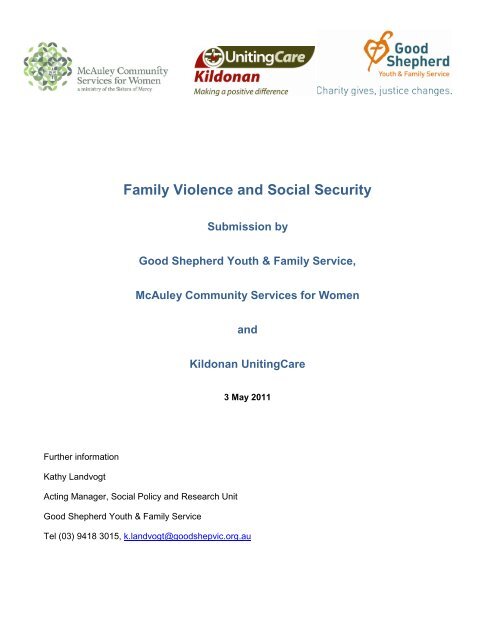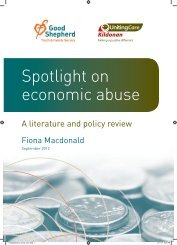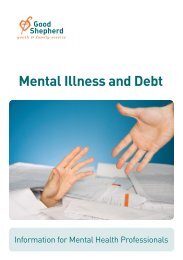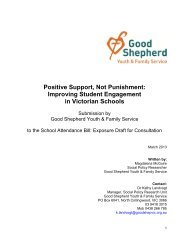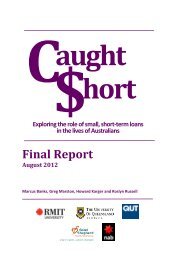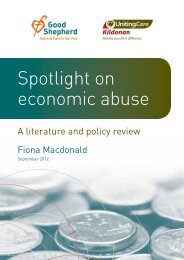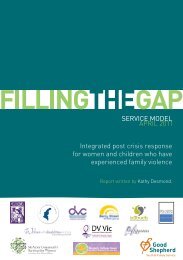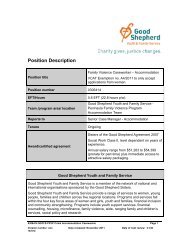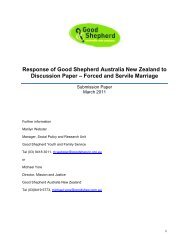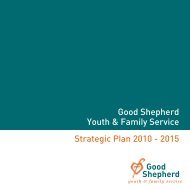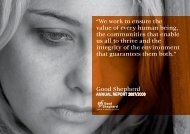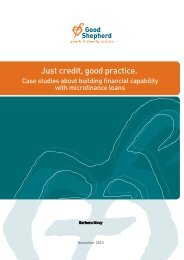Family Violence and Social Security - Good Shepherd Youth ...
Family Violence and Social Security - Good Shepherd Youth ...
Family Violence and Social Security - Good Shepherd Youth ...
You also want an ePaper? Increase the reach of your titles
YUMPU automatically turns print PDFs into web optimized ePapers that Google loves.
<strong>Family</strong> <strong>Violence</strong> <strong>and</strong> <strong>Social</strong> <strong>Security</strong><br />
Submission by<br />
<strong>Good</strong> <strong>Shepherd</strong> <strong>Youth</strong> & <strong>Family</strong> Service,<br />
McAuley Community Services for Women<br />
<strong>and</strong><br />
Kildonan UnitingCare<br />
3 May 2011<br />
Further information<br />
Kathy L<strong>and</strong>vogt<br />
Acting Manager, <strong>Social</strong> Policy <strong>and</strong> Research Unit<br />
<strong>Good</strong> <strong>Shepherd</strong> <strong>Youth</strong> & <strong>Family</strong> Service<br />
Tel (03) 9418 3015, k.l<strong>and</strong>vogt@goodshepvic.org.au
1. Introduction <strong>and</strong> capacity to comment<br />
<strong>Good</strong> <strong>Shepherd</strong> <strong>Youth</strong> & <strong>Family</strong> Service, McAuley Community Services for Women <strong>and</strong> Kildonan<br />
UnitingCare (Kildonan) welcome the opportunity to comment on legal reform needed in the social<br />
security provisions for victims of family violence. Our organisations work separately <strong>and</strong> together on<br />
improving the policy <strong>and</strong> service responses to family violence. In this submission our comments focus<br />
more on women experiencing intimate partner violence but we recognize that other family members<br />
perpetrate <strong>and</strong> suffer from violence in the home.<br />
In 2009 the Researching the gaps report was published by <strong>Good</strong> <strong>Shepherd</strong>, outlining the need for more<br />
long-term supports for women <strong>and</strong> children experiencing domestic violence, such as group work <strong>and</strong><br />
children’s support services. This echoed the findings of previous research undertaken by McAuley (then<br />
Mercy Care) in 2006, Mind the Gap: addressing service gaps in family violence. In 2010 this goal was<br />
pursued by <strong>Good</strong> <strong>Shepherd</strong> <strong>and</strong> McAuley through the Filling the Gap project which brought together a<br />
broad coalition of peak bodies <strong>and</strong> other key advocates to develop a service model (shortly to be<br />
published) to meet that need. <strong>Good</strong> <strong>Shepherd</strong> <strong>Youth</strong> & <strong>Family</strong> Service is currently also working in<br />
partnership with Kildonen UnitingCare to develop the community sector’s capacity to underst<strong>and</strong> <strong>and</strong><br />
respond to economic violence.<br />
<strong>Good</strong> <strong>Shepherd</strong>’s mission is to work to ensure that all people can “enjoy the fullness of life, which is the<br />
right of every human being”, <strong>and</strong> to “challenge those structures <strong>and</strong> beliefs that diminish human<br />
dignity”. We have a particular focus, historically <strong>and</strong> into the future, on working with the most<br />
marginalised women <strong>and</strong> girls. Each year we support more than 18,000 women, families <strong>and</strong> young<br />
people across Melbourne <strong>and</strong> the Mornington Peninsula including health <strong>and</strong> well being programs for<br />
vulnerable women <strong>and</strong> refuge services <strong>and</strong> support for women who are survivors of domestic violence.<br />
We are committed to helping strengthen families through family programs such as foster care, intensive<br />
family support <strong>and</strong> community programs including kindergarten <strong>and</strong> childcare. We also work with young<br />
people in providing housing, training, skills education <strong>and</strong> one off support. We underpin these services<br />
with a broad commitment to economic participation for all, through our no interest <strong>and</strong> low interest<br />
loans, financial counselling <strong>and</strong> buying services. The agency also supports independent research <strong>and</strong><br />
policy advocacy work through its <strong>Social</strong> Policy Research Unit which has made a number of policy<br />
submissions to government in the areas of both family violence <strong>and</strong> social security, most recently <strong>and</strong><br />
relevantly:<br />
• Response to <strong>Family</strong> <strong>Violence</strong> <strong>and</strong> Commonwealth Laws issues – Paper 37 Immigration (2011)<br />
• <strong>Good</strong> <strong>Shepherd</strong> Australia New Zeal<strong>and</strong> response to Federal Government Discussion Paper on<br />
The Criminal Justice Response to Slavery <strong>and</strong> People Trafficking, Reparations, <strong>and</strong> Vulnerable<br />
Witness Protections (2011)<br />
• <strong>Good</strong> <strong>Shepherd</strong> Australia New Zeal<strong>and</strong> response to Federal Government Discussion paper on<br />
Forced <strong>and</strong> Servile Marriage (2011)<br />
• Response to the national Exposure Draft <strong>Family</strong> Law Amendment (<strong>Family</strong> <strong>Violence</strong>) Bill 2010<br />
• Submission to the Review of Job Seeker Compliance System (2010)<br />
• Response to the Federal Government’s proposed ‘Income management’ legislation 2010<br />
• Submission to the Federal Government’s Human Rights consultation 2009<br />
2
• Submission to the Victorian Government’s Homelessness 2020 Strategy, 2009.<br />
With programs spanning both family violence <strong>and</strong> financial support, we have been able to contribute to<br />
recent knowledge-building about the links between financial dependence, financial abuse <strong>and</strong> family<br />
violence in general. We are engaged in conducting a literature review for Women’s Health Goulburn<br />
North East in their Tools for Change pilot program of financial mentoring for women who have<br />
experienced domestic violence. We have also contributed to the research reference group in a study<br />
conducted by Camcare into the financial literacy needs of women who have left violent relationships.<br />
McAuley Community Services for Women has more than twenty years experience assisting women<br />
who have experienced family violence through its Mercy Care crisis accommodation program for<br />
women <strong>and</strong> children experiencing family violence. McAuley Community Services for Women also has<br />
an advocacy program which supports women on an individual basis as well as on a broader policy<br />
level. McAuley Community Services for Women has recently participated in the following government<br />
inquiries <strong>and</strong> activities:<br />
• New Zeal<strong>and</strong> Women <strong>and</strong> <strong>Family</strong> <strong>Violence</strong><br />
• Inquiry into the adequacy <strong>and</strong> future directions of public housing<br />
• McAuley Community Services for Women’s Response to the Inquiry into Homelessness<br />
Legislation.<br />
• Public Housing Segmented Waiting List Review<br />
• <strong>Family</strong> <strong>Violence</strong> <strong>and</strong> Immigration.<br />
Kildonan is one of Australia's oldest community organisations, being first established in 1881. Kildonan<br />
services assist children, young people, individuals <strong>and</strong> families, in particular those facing economic<br />
hardship or social disadvantage. Programs span the primary, secondary <strong>and</strong> tertiary continuum from<br />
early years to more intensive <strong>and</strong> crisis support for families. The services areas of Inclusion & Energy,<br />
Clinical programs, Enterprise partnerships, <strong>Family</strong> <strong>and</strong> youth services <strong>and</strong> Community development<br />
enables the approaches of information provision, advocacy, case management <strong>and</strong> support services<br />
<strong>and</strong> group programs to feature at Kildonan. In 2010 Kildonan provides support <strong>and</strong> assistance to almost<br />
5000 individuals <strong>and</strong> their families.<br />
Over time, Kildonan has developed a platform of programs <strong>and</strong> services, which provide a holistic,<br />
streamlined, wrap-around response to the growing number of families <strong>and</strong> individuals seeking support<br />
<strong>and</strong> access to services. For example, men <strong>and</strong> women referred to family violence services at Kildonan<br />
can also access family support, financial counselling, individual counselling <strong>and</strong> group programs to help<br />
manage their unique situation <strong>and</strong> specifically behaviour change.<br />
3
2. Response to questions<br />
Definition of family violence<br />
Question 1: Definition of family violence<br />
A best practice definition adopted nationally including within all states <strong>and</strong> territories will aid victims to<br />
achieve justice <strong>and</strong> be adequately supported in their journey away from violence, as well as increasing<br />
community awareness <strong>and</strong> prevention.<br />
Victoria’s family violence reforms include a strong <strong>and</strong> comprehensive definition. The Code of Practice<br />
for Specialist <strong>Family</strong> <strong>Violence</strong> Services for Women <strong>and</strong> Children (DV Vic 2006) defines family violence<br />
as:<br />
the repeated use of violent, threatening, coercive or controlling behaviour by an individual<br />
against a family member(s), or someone with whom they have, or have had, an intimate<br />
relationship. Violent behaviour includes not only physical assaults but an array of power <strong>and</strong><br />
control tactics used along a continuum in concert with one another, including direct or indirect<br />
threats, sexual assault, emotional <strong>and</strong> psychological torment, economic control, property<br />
damage, social isolation <strong>and</strong> behaviour which causes a person to live in fear. (Practice<br />
Guidelines: Women <strong>and</strong> children’s family violence counselling <strong>and</strong> support programs DHS<br />
2008)<br />
Victoria’s <strong>Family</strong> <strong>Violence</strong> Protection Act (2008) defines family violence as:<br />
a. behaviour by a person towards a family member if that behaviour<br />
(i) is physically or sexually abusive; or<br />
(ii) is emotionally or psychologically abusive; or<br />
(iii) is economically abusive; or<br />
(iv) is threatening; or<br />
(v) is coercive; or<br />
(vi) in any other way controls or dominates the family member <strong>and</strong><br />
causes that family member to feel fear for the safety or wellbeing of<br />
that family member or another person; or<br />
b. behaviour by a person that causes a child to hear or witness, or otherwise be exposed to the<br />
effects of, behaviour referred to in paragraph (a).<br />
The Victorian Indigenous <strong>Family</strong> <strong>Violence</strong> Taskforce has defined family violence as:<br />
An issue focused around a wide range of physical, emotional, sexual, social, spiritual, cultural,<br />
psychological <strong>and</strong> economic abuses that occur within families, intimate relationships, extended families,<br />
kinship networks <strong>and</strong> communities. It extends to one-on-one fighting, abuse of Indigenous community<br />
4
workers, as well as self-harm, injury <strong>and</strong> suicide. (Practice Guidelines: Women <strong>and</strong> children’s family<br />
violence counselling <strong>and</strong> support programs DHS 2008)<br />
Recommendation 1:<br />
A broader definition of family violence as provided in the <strong>Family</strong> <strong>Violence</strong> – A National Legal<br />
Response report should be inserted into the <strong>Social</strong> <strong>Security</strong> Acts, including not only physical<br />
forms of abuse <strong>and</strong> intimidation, but also emotional, psychological, sexual <strong>and</strong> financial abuse<br />
to describe the range of ways in which power <strong>and</strong> control are used by perpetrators.<br />
Identifying, informing <strong>and</strong> collecting information about family violence<br />
Questions 2 <strong>and</strong> 3: Centrelink staff inquiries <strong>and</strong> prompts about family violence<br />
Multiple barriers prevent victims from disclosing family violence. Shame at disclosing the violence is the<br />
main barrier, but also significant are lack of knowledge both of what constitutes family violence legally<br />
<strong>and</strong> of the significance of family violence in obtaining social security entitlements. Very often those who<br />
are affected by violence have not been service users in the past so are completely unfamiliar with the<br />
system. There is a tendency in Centrelink personnel to assume that people know the system, <strong>and</strong> to<br />
forget that people ‘do not know what they do not know’.<br />
In particular financial or economic abuse is often unrecognised, even by the victim themselves.<br />
Financial abuse occurs across all groups of women but is often less readily identified than other forms<br />
of abuse, partly because it is relatively recently included in commonly accepted definitions of domestic<br />
violence. While community awareness of other forms of domestic violence is increasing, awareness of<br />
forms of financial abuse lags behind (Victorian Health Promotion Foundation, 2010). For women<br />
leaving an abusive relationship a key task is to disentangle themselves from their former partner’s life,<br />
<strong>and</strong> financial issues can present special difficulties which are often compounded by the victim’s lack of<br />
financial experience <strong>and</strong> knowledge. These issues particularly impact on social security entitlements.<br />
The results of economic abuse can be extreme deprivation. Economic abuse erodes financial<br />
resources <strong>and</strong> undermines employment <strong>and</strong> education, resulting in longer term financial insecurity <strong>and</strong><br />
thereby increases the risk of returning to abusive partners <strong>and</strong> to a cycle of violence. Financial abuse<br />
can also continue after the relationship ends. After separation, bureaucracies can sometimes add to<br />
rather than reduce problems, for example, Child Support is often not paid (Branigan, 2007).<br />
Recommendation 2:<br />
Centrelink staff should routinely screen customers for family violence <strong>and</strong> Centrelink application<br />
forms, correspondence <strong>and</strong> telephone prompts should include questions about family violence,<br />
including financial abuse, as a matter of course.<br />
Question 4: Centrelink’s response to victims – notification of eligibility<br />
Victims of family violence are not always informed adequately of their entitlements to social security<br />
resulting from the violence, <strong>and</strong> this can have very damaging effects. Centrelink is notorious in some<br />
circles for not volunteering information about eligibility <strong>and</strong> exemptions. This applies across all benefits<br />
but in family violence situations can have drastic <strong>and</strong> insidious consequences. Women report that it is<br />
5
often extremely difficult to obtain adequate or consistent information about entitlements or get<br />
personalised support from Centrelink: "the system is punitive, not supportive…” according to one<br />
woman (Australian Government Office for Women 2007). The research supports what practitioners<br />
already know, that income security is of pivotal importance to women leaving an abusive relationship.<br />
Centrelink policies <strong>and</strong> processes need to keep up with the growing underst<strong>and</strong>ings of financial abuse<br />
<strong>and</strong> financial dependence in DV situations (Braaf, 2009; Meyering, 2010; Braaf <strong>and</strong> Meyering, 2011).<br />
One community agency that interviewed women who have experienced domestic violence about their<br />
financial needs found that<br />
“the women reported how they often found out about financial supports well after the time they<br />
needed them. The women gave an example of the difference it would have made if they had<br />
been informed of the Centrelink Crisis Payment at the time of leaving the relationship <strong>and</strong> their<br />
disappointment about finding out about it later.”<br />
On the other h<strong>and</strong>, in general when our case workers have been in conversation with Centrelink<br />
workers about exemptions periods they are usually helpful <strong>and</strong> flexible. However we are not confident<br />
that this would be the same case if the woman was to be self advocating with Centrelink as they do not<br />
have the same knowledge.<br />
Recommendation 3:<br />
Centrelink workers be trained <strong>and</strong> supervised to be better informed <strong>and</strong> forthcoming with<br />
entitlement information, <strong>and</strong>/or a specifically trained Centrelink officer/social worker be allocated<br />
to a victim form the time they first disclose the violence.<br />
Question 5: Information sharing between government agencies<br />
As argued in the <strong>Good</strong> <strong>Shepherd</strong> Australia New Zeal<strong>and</strong> submission to ALRC on family violence <strong>and</strong><br />
immigration law (2011), it is important as far as possible to avoid the trauma to victims of having to retell<br />
their story repeatedly to different government or legal agencies.<br />
As one community agency (Camcare, unpublished research, 2010) relates it, women commonly<br />
claimed that the trauma <strong>and</strong> complexity of domestic violence is not really understood in government<br />
procedures <strong>and</strong> “women feel ‘belittled’, ‘humiliated’ <strong>and</strong> ‘abused’ by the Child Support Agency <strong>and</strong><br />
Centrelink”. Looking at the procedures from the point of view of the victims of family violence would<br />
reveal ways in which those procedures could be improved, including minimising the requirement to<br />
repeatedly relate the nature <strong>and</strong> circumstances of their abuse.<br />
Recommendation 4:<br />
Procedures need be developed for information about family violence to be shared, with<br />
appropriate consent from the victim <strong>and</strong>/or legal safeguards, between relevant government<br />
bodies, <strong>and</strong> between Centrelink <strong>and</strong> the Child Support Agency in particular.<br />
6
Question 6: How Centrelink collects information about family violence when it is identified<br />
There is evidence from interviews with women affected by family violence that Centrelink officers do not<br />
always adequately consider the existence of family violence. In particular the primordial importance of<br />
safety considerations is not enshrined as it should be in procedures.<br />
For example, in one community-based study a woman reported being asked to retrieve documents<br />
from the family home even though she had left to escape domestic violence perpetrated by her<br />
husb<strong>and</strong> (Camcare, unpublished research 2010).<br />
At times victims may not be at liberty to seek information from Centrelink without the perpetrator being<br />
present. The inability to have a private conversation should be a trigger to Centrelink staff to seek to<br />
check if family violence is present.<br />
Recommendation 5:<br />
Centrelink staff receive additional training <strong>and</strong> supervision to ensure they follow <strong>and</strong> interpret<br />
procedures to ensure as best they can the safety of victims <strong>and</strong> their access to income security<br />
entitlements <strong>and</strong>/or a specifically trained Centrelink officer/social worker be allocated to a victim<br />
from the time they first disclose the violence.<br />
Question 7: Centrelink access to other information about family violence<br />
The national register recommended in <strong>Family</strong> <strong>Violence</strong> – A National Legal Response would be a<br />
suitable source of information about family violence victims as reported to, <strong>and</strong> acted upon by, other<br />
government systems (e.g. legal, paralegal, financial). As safety is the paramount concern access to this<br />
information would need proper training <strong>and</strong> security <strong>and</strong> may be best limited to Centrelink social<br />
workers, who should deal with all initial applications <strong>and</strong> significant follow-up contacts with victims of<br />
family violence.<br />
Recommendation 6:<br />
A national register be created to expedite the access to family violence information relevant to<br />
making social security assessments <strong>and</strong> ensuring other government entitlements, <strong>and</strong><br />
processes to ensure privacy <strong>and</strong> safety in the course of its use be developed <strong>and</strong> implemented.<br />
Question 8: Centrelink staff considering family violence when seeking information from a<br />
partner<br />
Our workers report that inappropriate <strong>and</strong> unsafe interviewing of abusive family members (partners) in<br />
family violence situations has occurred in the past. Practices in this regard may be improving. However,<br />
the practice of Centrelink staff assisting victims of family violence is highly variable, ranging from<br />
exceptionally knowledgeable <strong>and</strong> skillful to inadequate <strong>and</strong> unjust. Given this, there are no doubt<br />
instances where information is inappropriately sought from partners or family members, thus<br />
endangering victims.<br />
Recommendation 7:<br />
7
Further <strong>and</strong> regular training <strong>and</strong> supervision of all Centrelink staff needs to include:<br />
underst<strong>and</strong>ings of family violence as the exercise of power <strong>and</strong> control; risk assessments <strong>and</strong><br />
safety priorities; <strong>and</strong> social security law <strong>and</strong> regulations relating to family violence.<br />
Question 9: Centrelink methods of assessing family violence<br />
In situations where contact with a partner or other family member is not appropriate due to family<br />
violence, claims may be verified through assessments by an independent expert, facilitated by a<br />
Centrelink social worker. If no independent expert is available or in situations of urgency, a Centrelink<br />
social worker professional assessment should be regarded as sufficient to verify the circumstances.<br />
Anecdotal information from a number of women interviewed through our research projects (Healey,<br />
2009; L<strong>and</strong>vogt, 2008) <strong>and</strong> in our direct service contexts points to the responsiveness of Centrelink<br />
social workers to individual situations of trauma, <strong>and</strong> of their importance to disempowered individuals in<br />
navigating the social security system. For this reason we place particular importance on supporting <strong>and</strong><br />
strengthening the Centrelink social work services as an integral part of the family violence response.<br />
Recommendation 8:<br />
The role of Centrelink social work services as an integral <strong>and</strong> leading part of the family violence<br />
service response needs to be supported <strong>and</strong> strengthened.<br />
Question 10: Ensuring that victims know they will not contact a partner if family violence exists<br />
It seems clear from instances reported through research <strong>and</strong> practice that many victims of family<br />
violence would not be aware that Centrelink will not automatically contact a partner to verify the need<br />
for an application, <strong>and</strong> that this would keep them from accessing their entitlements, or even keep them<br />
in an abusive situation. It is certainly the case that many women do not attempt to secure their Child<br />
Support entitlements because they do not wish to open the way for any contact with the perpetrator, so<br />
we know this concern is very present amongst victims.<br />
Recommendation 9:<br />
Centrelink staff members need to be trained to ensure the victims know that abusive family<br />
members will not be contacted in relation to their claim for income security <strong>and</strong>/or a specifically<br />
trained Centrelink officer/social worker needs to be allocated to a victim form the time they first<br />
disclose the violence.<br />
Question 11: Consideration of family violence by Centrelink decision-makers<br />
There is variation in the way family violence is taken into account by Centrelink decision-makers,<br />
resulting in lack of natural justice, in material deprivation, <strong>and</strong> in some cases in increased exposure to<br />
violence. For example, women on a sole parent payment are denied access to Crisis Payment when<br />
they reveal they have a partner, albeit an abusive one. Assumptions are made that these women are in<br />
de facto relationships with financial support <strong>and</strong> therefore wrongly claiming sole parent payment. In<br />
many cases there may be little or no financial support from the partner, in fact financial abuse <strong>and</strong><br />
exploitation commonly occur as part of the pattern of violence.<br />
8
In other situations, people who have no address due to homelessness resulting from family violence<br />
are denied access to the Crisis Payment. Staff need to be made aware that people who are homeless,<br />
or temporarily so, can still be entitled to Centrelink payments. Computer record systems need to be<br />
changed to ensure this is readily achieved where necessary, <strong>and</strong> then reviewed within a reasonable<br />
period of time.<br />
Recommendation 10:<br />
Procedures, IT systems <strong>and</strong> regular staff training <strong>and</strong> supervision need to be reviewed <strong>and</strong><br />
modified to ensure that due processes <strong>and</strong> natural justice are applied to victims of family<br />
violence.<br />
Relationships <strong>and</strong> social security law<br />
Questions 12 <strong>and</strong> 13: ‘Member of a couple’ criteria to take account of family violence<br />
Given the high incidence of financial abuse coming to light within family violence, a thorough review of<br />
income security policies <strong>and</strong> procedures is required to bring them into line with current knowledge. AS<br />
income security is primarily a financial resource, the ways in which it intersects with, impacts on, <strong>and</strong> is<br />
exploited within family violence need to be better understood.<br />
Recommendation 11:<br />
New research is required to investigate <strong>and</strong> document the ways in which economic /financial<br />
abuse interact with income security, in particular in the Australian context.<br />
The high incidence of economic abuse in family violence means that the automatic treatment of<br />
financial resources in a couple as pooled should not occur. The assumption needs to be reversed in<br />
instances of family violence, <strong>and</strong> financial resources within a couple should be treated as separate until<br />
proven otherwise in a thorough assessment. The risk of further abuse needs to be weighed against the<br />
risk of providing income security when the victim has access to other resources, but the government’s<br />
responsibility not to further endanger victims is paramount. An early review conducted by a Centrelink<br />
social worker can recommend if the income security should not continue.<br />
Recommendation 12:<br />
Centrelink policies <strong>and</strong> procedures need to be thoroughly reviewed <strong>and</strong> changed to reflect the<br />
current knowledge of the incidence <strong>and</strong> types of economic/financial abuse <strong>and</strong> re-training <strong>and</strong><br />
further guidance should be instituted to reflect these changes.<br />
9
Q 13 to 18: <strong>Family</strong> violence considerations in determining ‘separation under one roof’ <strong>and</strong> as a<br />
‘special reason’<br />
<strong>Family</strong> violence is not currently adequately considered in determining separation under one roof in the<br />
experience of our agencies’ workers. In some instances a victim of family violence is unable to make<br />
plans to leave <strong>and</strong>/or to change names or beneficiaries on wills, superannuation, joint accounts, <strong>and</strong><br />
other financial products or services. Even though evidence shows it is not as ‘unusual, uncommon or<br />
exceptional’ as perhaps believed in the past, family violence should be explicitly regarded as a ‘special<br />
reason’ for not being treated as a member of a couple under the <strong>Social</strong> <strong>Security</strong> Act.<br />
This can be very difficult to assess with confidence, due in part to the complexity <strong>and</strong> lack of<br />
transparency of some financial arrangements <strong>and</strong> in part to the use of power <strong>and</strong> control by one of the<br />
parties over the other. This becomes an area requiring additional expertise. Where the abusive partner<br />
cannot be interviewed to determine the existence of separation under one roof, a professional<br />
assessment by a trained Centrelink social worker is required.<br />
Recommendation 13:<br />
Centrelink policies <strong>and</strong> procedures should be reviewed to explicitly treat family violence as a<br />
valid reason for being regarded as ‘separated under one roof’, <strong>and</strong> as a ‘special reason’ for not<br />
being treated as a member of a couple, as assessed by a Centrelink social worker, <strong>and</strong> further<br />
guidance should be provided to Centrelink officers in keeping with this.<br />
Questions 19 - 23 regarding young people experiencing family violence <strong>and</strong> access to social<br />
security<br />
Unfortunately time constraints prevent us commenting on these very important questions. However we<br />
support the ALRC to thoroughly review these areas of social security.<br />
Eligibility requirements<br />
Question 24: Documentary proof requirements <strong>and</strong> safety<br />
If the family violence victim has left the family home she often does not have access to documents<br />
required such as the partner’s income, <strong>and</strong> details of other assets, loans, or external expenses such as<br />
gambling. Even if the abused person is still in an unsafe environment it does not mean she has access<br />
to relevant documents. Whether living within or away from the home, trying to secure those documents<br />
may place them in an unsafe environment.<br />
We are aware of instances where Centrelink has denied crisis payments to victims of family violence<br />
on the basis that there was no police involvement (that is, no intervention order, safety notice or police<br />
documentation was available). This forces the woman to choose between involving police <strong>and</strong> having<br />
no economic assistance.<br />
Recommendation 14:<br />
Centrelink officers need further training <strong>and</strong> supervision about the range of possible evidence<br />
testifying that family violence has occurred.<br />
10
Women are often in such a state of transition that they cannot give Centrelink an address which always<br />
causes an issue. When women provide PO Boxes whilst residing in a crisis service or refuge, mail is<br />
long delayed before it gets to them. This can be because they leave <strong>and</strong> go to a motel, another refuge<br />
etc.<br />
Recommendation 15:<br />
Centrelink needs to cater for women who are in a state of transition between residences <strong>and</strong> are<br />
not able to provide an address at the present time including developing methods of processing<br />
applications without a current residential address (such as email).<br />
In addition, Centrelink sometimes continues to send mail to the women’s former address creating safety<br />
risks as often the perpetrator of violence will then know the women’s affairs. Further, our workers have<br />
experienced Centrelink staff who have refused to remove the women’s previous address until a new<br />
address has provided. This results in the mail being sent to the old address <strong>and</strong> raises the same issues<br />
as above (delays in applications as well as placing the women at further risk through the perpetrator of<br />
violence knowing her affairs).<br />
Recommendation 16:<br />
Case study:<br />
Centrelink needs to be more diligent in not sending mail to the former address of victims.<br />
A deaf client had her payments suspended when she did not provide a recent medical review to<br />
prove she was deaf. She did not know this was requested because she was in crisis<br />
accommodation <strong>and</strong> her mail was being sent to previous address. The woman could not speak<br />
to Centrelink as she did not have access to a TTY. The worker spoke to Centrelink on her<br />
behalf <strong>and</strong> with her consent <strong>and</strong> was told a medical review for DSP payment was needed for<br />
her application to continue.<br />
Question 25: Exemptions from waiting periods for newly arrived<br />
We refer the ALRC to the Submission by <strong>Good</strong> <strong>Shepherd</strong> Australia New Zeal<strong>and</strong> on <strong>Family</strong> <strong>Violence</strong><br />
<strong>and</strong> Immigration (April 2011) for consideration of issues affecting women on visas who experience<br />
family violence.<br />
Question 26 <strong>and</strong> 27: Activity <strong>and</strong> participation tests<br />
Income security policies in Australia have been moving towards the US approach which assumes that<br />
virtually everyone is capable of being financially independent through paid work, but this policy<br />
seriously underestimates the effect of personal <strong>and</strong> family barriers on employment. "Welfare recipients<br />
are often treated as if their employment <strong>and</strong> welfare trajectories were solely the result of personal<br />
characteristics. Clearly, family variables affect individual choices <strong>and</strong> constraints" (Taylor, 2004 p.179).<br />
Women parenting alone may have very limited opportunities for suitable paid work that can fit in with<br />
caring responsibilities. For women whose health, social capital, <strong>and</strong> finances are compromised by<br />
11
suffering DV, employment may well be even less obtainable. Domestic violence <strong>and</strong> its health aftereffects<br />
are identified as an obstacle to employment in numerous studies, along with physical disabilities<br />
<strong>and</strong> health limitations, mental health problems, substance abuse, children's health or behavioural<br />
problems, housing instability, involvement with child protection, low education/skill level, etc., which<br />
often occur in association with domestic violence.<br />
If the ‘welfare to work’ approach is too severe women who are not in a position to be financially<br />
independent are forced back into dependency on abusive men (Scott et al, 2002). Some women need<br />
to rely on income security as a result of domestic violence for only a short period, but for others the<br />
damage is such that it takes several years for them to re-establish stability in their lives. This is<br />
especially the case if family violence is layered on top of a lack of social capital <strong>and</strong> multiple types of<br />
disadvantage <strong>and</strong> social exclusion (Healey, 2009).<br />
If exemption periods for ‘activity <strong>and</strong> participation’ need to be further extended because of family<br />
violence, Centrelink could require a medical certificate. Medical practitioners may be accepted in the<br />
household by the perpetrator to a degree greater than other professionals.<br />
Recommendation 17:<br />
Centrelink policies <strong>and</strong> procedures should be reviewed to bring them in line with current<br />
underst<strong>and</strong>ings of family violence <strong>and</strong> its impact on ability to participate in education <strong>and</strong><br />
employment, including the possible multiple long term health <strong>and</strong> social impacts.<br />
Recommendation 18:<br />
Duress<br />
Centrelink should introduce a procedure for the exemption period being extended subject to a<br />
medical report <strong>and</strong> Centrelink social worker assessment.<br />
Question 28: Debts<br />
It is vital that Centrelink officers gathering information <strong>and</strong> making determinations about entitlements<br />
based on family violence have a thorough underst<strong>and</strong>ing of economic violence as being fundamentally<br />
the exercise of power <strong>and</strong> control over a person. Furthermore, in a market-based society there are any<br />
number of ways of exercising power <strong>and</strong> control using money, access to it, <strong>and</strong> its uses. Financial or<br />
economic abuse includes but is not limited to:<br />
• control over day-to-day household finances <strong>and</strong> material wellbeing, for example<br />
o denying the woman access to any money of her own, to the family’s money, or to bank<br />
accounts<br />
o making her ask/beg for money from him<br />
o unilaterally setting an inadequate figure to cover household costs<br />
o stealing from the woman<br />
o denying access to financial information <strong>and</strong> decision-making<br />
o making the woman financially dependent <strong>and</strong> unable to meet basic needs<br />
12
o subjecting the woman to food insecurity<br />
• denying accumulation of personal assets or eroding those assets, for example<br />
o exerting power <strong>and</strong> control over a woman's salary, savings, debt, credit, <strong>and</strong><br />
employment through actions or threats<br />
o bleeding dry the woman’s personal financial resources<br />
o using joint funds to gamble<br />
o destroying the woman’s possessions<br />
• manipulating credit <strong>and</strong> debt to the abused partner’s disadvantage, for example<br />
o making the woman financially responsible for debt<br />
o building up debt <strong>and</strong> affecting a woman's credit rating<br />
o utilities or loans being registered in only the woman's name<br />
o the woman being forced to survive by accumulating debt<br />
o the woman being made bankrupt for his debts<br />
• blocking access to social <strong>and</strong> economic participation, for example<br />
o sabotaging education or employment through diverse tactics<br />
o not allowing the woman to work<br />
o denying access to means of transport or communication<br />
• monitoring, over-controlling <strong>and</strong> scrutinizing the woman, for example<br />
o maintaining dominance without physical contact<br />
o exerting control after the woman has left<br />
• refusing to contribute, for example<br />
o not being accountable for his own spending<br />
o refusing to work or claim benefits<br />
o refusing to pay bills<br />
• exploiting women sexually in exchange for money<br />
(compiled from a number of Australian <strong>and</strong> international sources including Branigan, 2007;<br />
Australian Government Office for Women, 2007; Schobe <strong>and</strong> Dienemann, 2007; Saunders at al<br />
2007; Sharp, 2008)<br />
A UK study looked at the financial wellbeing of women over time who had been subjected to economic<br />
abuse (Sharp 2008). The changing percentages tell their own story <strong>and</strong> raise many questions for<br />
further research:<br />
Positive responses to<br />
whether they were/had:<br />
Before<br />
meeting<br />
abuser<br />
Whilst with<br />
abuser<br />
After<br />
leaving<br />
abuser<br />
Undertaking education 37% 18% 30%<br />
In paid employment 47% 37% 16%<br />
Receiving benefits 18% 51% 84%<br />
Savings 37% 20% 20%<br />
Loan/credit card/ overdraft 12% 39% 30%<br />
Rent arrears 20% 33% 55%<br />
Other debts 8% 41% 37%<br />
13
Because social security is a source of money, duress in relation to accessing social security<br />
entitlements can be exercised by the perpetrator in most of the above manifestations of abuse. Debt<br />
can be put into the victim’s name directly or she can be reduced to a situation of debt if, for example,<br />
the perpetrator prevents her working, or forces her to take on an unfair proportion of household costs. If<br />
she resists abuse she may be punished financially. Where there is a joint debt, a violent partner may<br />
not be making payments, thus financially disadvantaging the abused family member.<br />
It is also well-established that women often stay in, <strong>and</strong> return to, abusive relationships due to lack of<br />
sufficient financial resources to live independently (Meyering, 2010). Fear of the repercussions of a<br />
Centrelink debt, where one exists, could well contribute to this.<br />
The <strong>Social</strong> <strong>Security</strong> Act should therefore be amended to expressly provide for the waiver of Centrelink<br />
debt in such situations, after suitable assessment. In the immediate situation, there should be a<br />
moratorium on all pursuit of such debts <strong>and</strong> the victim should be informed of this.<br />
Recommendation 19:<br />
The <strong>Social</strong> <strong>Security</strong> Act should be amended expressly to provide for debts to be waived in<br />
situations where a person has been subjected to duress or financial abuse in relation to the<br />
debt, as determined by a Centrelink social worker <strong>and</strong> wherever possible a financial counsellor<br />
or other relevant third party.<br />
Question 29:<br />
Some of our financial counselling services are currently dealing with instances where abusive partners<br />
use st<strong>and</strong>-over tactics to get access to a woman’s Crisis Payment <strong>and</strong>/or advance payment. Although<br />
we are not aware of any specific nominee problems, given the vulnerability to economic abuse created<br />
by having a nominee receiving the payments, additional checks should be put in place. Potentially<br />
elders <strong>and</strong> disabled clients are perhaps especially open to this form of abuse.<br />
Recommendation 20:<br />
Centrelink should introduce additional checks to ensure that nominees are acting in the best<br />
interests of the person on whose authority they are acting.<br />
Payments <strong>and</strong> payment arrangements<br />
Questions 30-33 Crisis Payments<br />
Women are often not aware of the fact that they are entitled to a Crisis Payment, or that they can<br />
receive up to four payments in a twelve month period.<br />
Recommendation 21:<br />
Centrelink staff need to receive adequate training <strong>and</strong> supervision to ensure they proactively<br />
provide this information.<br />
14
Currently Crisis Payment is an additional payment to an income support payment. A person not on any<br />
income support has to apply for <strong>and</strong> be eligible for this before being allowed to apply for a Crisis<br />
Payment. This creates an unduly long, time-consuming <strong>and</strong> arduous process of registering with<br />
Centrelink before they are able to receive a Crisis Payment. It also may contribute to lack of knowledge<br />
of this form of financial assistance. Financial hardship should be the trigger for receiving Crisis<br />
Payment. Consideration for the material needs of children is often a primary reason for staying in a<br />
violent relationship if the mother cannot meet these needs herself.<br />
This money is often vital for a women’s independence <strong>and</strong> ultimately her safety. In our experiences<br />
women are spending their Crisis Payments on the following:<br />
Bonds for refuges (often $100 is required for linen etc)<br />
Petrol to get to the refuge<br />
Food toiletries<br />
Clothing<br />
Baby needs<br />
These are items that are considered basic needs <strong>and</strong> are urgently required.<br />
<strong>Family</strong> violence often also includes economic abuse <strong>and</strong> the Crisis Payment can be the determining<br />
factor as to whether she returns to the perpetrator of violence or not. The purpose of the Crisis<br />
Payment is to provide instantaneous relief, but in effect this often does not occur. <strong>Family</strong> violence<br />
victims are dealing with a great deal in the first week: the extreme safety concerns, disruption to normal<br />
life commonly including household relocation, difficulties accessing documents, necessary dealings<br />
with multiple legal, health <strong>and</strong> other services, <strong>and</strong> the priority concern of care for children. This makes<br />
the Crisis Payment application’s ‘7 day from when the violence occurred rule’ unreasonable.<br />
Recommendation 22:<br />
Case study:<br />
Crisis Payment needs to be made more available to victims of family violence by becoming a<br />
st<strong>and</strong>-alone payment <strong>and</strong> having a faster <strong>and</strong> more flexible registration process including<br />
greater time to claim.<br />
“A woman spent more than one week in hospital due to domestic violence <strong>and</strong> upon leaving<br />
hospital was taken to MCSW crisis accommodation program. She was 38 weeks pregnant <strong>and</strong><br />
was suffering from Gestational Diabetes. She was denied a crisis payment for two primary<br />
reasons:<br />
The incidence of violence had occurred more than 7 days ago (it had occurred 10 days ago<br />
when she made the application. The fact she was in unconscious <strong>and</strong> hospitalized due to the<br />
act of family violence was disregarded). The MCSW staff member advocating on behalf of the<br />
women pleaded with City of Yarra Centrelink <strong>and</strong> offered hospital certificates. Payment was<br />
denied.<br />
15
The act of family violence did not occur in her home, therefore Centrelink, City of Yarra stated,<br />
‘If it is outside the home it is an assault <strong>and</strong> not domestic violence’. Upon contesting this the<br />
MCSW staff member was told, ‘Imagine if every person who was assaulted got a crisis<br />
payment, how many people would be entitled to crisis payments?’. The MCSW staff member<br />
argued that firstly the perpetrator of violence (as disclosed in the police report) was known to<br />
Centrelink as the women’s partner <strong>and</strong> in addition the women had to leave the home <strong>and</strong> was<br />
residing (via the hospital) at a crisis accommodation program for women <strong>and</strong> children who have<br />
experienced family violence. Payment was denied.<br />
The MCSW staff member spent six hours in one day on the phone to Centrelink, speaking to<br />
general staff from the call centre, staff from the relevant office, team leaders <strong>and</strong> then finally<br />
management who also denied the claim. A final, <strong>and</strong> desperate phone call was made at the end<br />
of the day to the manager of the above office with a promise that MCSW would be in contact<br />
with the media due to the absurdity of the decision. With this threat a crisis payment was issued<br />
to the women.”<br />
Case study:<br />
“Prior to arriving at MCSW crisis accommodation program, a Women’s Domestic <strong>Violence</strong> Crisis<br />
Service worker had enquired about crisis payment days prior for a women who was deaf. When<br />
the MCSW case worker enquired about the status of the application the worker was told there<br />
was no such enquiry in the system <strong>and</strong> that the 7 day period had now expired <strong>and</strong> client would<br />
not be eligible. The worker argued that the enquiry had been made <strong>and</strong> went back through <strong>and</strong><br />
referred to client case notes. The worker was then told that there was an application in the<br />
system <strong>and</strong> all the client had to do was present at an office with ID <strong>and</strong> she would receive cash<br />
or an EBT card.<br />
The MCSW worker took the client into a Centrelink office where she was told that was not the<br />
case <strong>and</strong> she would need to speak to a social worker on the phone – but the client was not able<br />
to do this as she is deaf. Centrelink worker suggested the client’s 12 year old daughter speak to<br />
the social worker, the client did not want this responsibility placed on her daughter <strong>and</strong><br />
consented to the worker speaking on her behalf. A four-way phone conversation was had with<br />
the worker, the client, the Centrelink worker <strong>and</strong> the social worker <strong>and</strong> the conversation was<br />
written for the client to underst<strong>and</strong>. Centrelink questioned the 7 day period for a long-time based<br />
on when the client entered the service even though the office worker could see she was eligible<br />
based on dates given. Crisis payment was granted <strong>and</strong> the Centrelink worker updated mailing<br />
details <strong>and</strong> DSP payment.”<br />
Eligibility criteria require the perpetrator to have lived with the victim immediately before leaving the<br />
violence (or the perpetrator leaves). This unreasonably restricts eligibility for income security. Post<br />
separation violence is a very common <strong>and</strong> serious form of family violence. The Victorian family violence<br />
16
legislation provides a broad definition of who may be included as a family member for the purposes of<br />
the legislation, for example including in some cases live-in carers.<br />
Recommendation 23:<br />
Eligibility for Crisis Payment needs to be broadened to ensure victims of family violence are not<br />
prevented from accessing it, regardless of where they are living or who the perpetrator was.<br />
Support workers in family violence services report that nearly every member of Centrelink staff<br />
contacted has a different opinion as to the availability <strong>and</strong> entitlements to Crisis Payment. Centrelink<br />
social worker assessments, plus wherever possible a third party report, should be used to determine<br />
that the victim is in crisis <strong>and</strong> that she does not have adequate access to financial resources to provide<br />
for herself <strong>and</strong> her family. Not all Centrelink offices have social workers on site, delaying the process if<br />
women go into an office to apply. Further, women are often requested to go into an office that is not<br />
safe as the perpetrator of violence might also be there.<br />
Recommendation 24:<br />
Ensure social workers are more accessible <strong>and</strong> available from more offices <strong>and</strong>/or via the<br />
telephone.<br />
Recommendation 25:<br />
Centrelink staff need to be better trained <strong>and</strong> made aware of the policies <strong>and</strong> guidelines <strong>and</strong> the<br />
discretion they have in applying these.<br />
Question 34: Rent assistance<br />
Given that family violence occurs across all socio-economic groups in society, <strong>and</strong> the prevalence of<br />
financial abuse already noted which keeps many abused women particularly in a financially dependent<br />
position, Rent Assistance should also apply to mortgage repayments in situations of family violence<br />
where there is risk that the family home will be lost due to inability to keep up mortgage payments.<br />
Recommendation 26:<br />
The definition of rent in the <strong>Social</strong> <strong>Security</strong> Act should expressly include mortgage repayments<br />
where family violence is an issue.<br />
Questions 35-37 Weekly payments <strong>and</strong> urgent payments<br />
<strong>Family</strong> violence victims are often not aware of the availability of either weekly payments, or urgent<br />
hardship payments (i.e. payments in advance). In principle, they should be given as many options as<br />
possible in relation to payment methods <strong>and</strong> timing, as they need to make a number of difficult<br />
decisions <strong>and</strong> juggle children’s needs <strong>and</strong> safety considerations. Inflexibility from Centrelink at this time<br />
can exacerbate their difficulties.<br />
17
Recommendation 27:<br />
Where family violence is an issue Centrelink officers should make weekly payment options <strong>and</strong><br />
urgent payments an accessible option.<br />
Income management<br />
Question 38-44<br />
People experiencing family violence should be exempted from the income management regime except<br />
in cases where individual determinations are made within a statutory case management process. We<br />
recognise the difficulty <strong>and</strong> urgency of responding to family violence in general, <strong>and</strong> the particular<br />
difficulties experienced in some remote communities. As agencies based in <strong>and</strong> around Melbourne we<br />
have no specific programs working with these Indigenous communities so do not address the issues<br />
from this perspective. However, in addition to our experience <strong>and</strong> research with women who have<br />
experienced family violence, we have extensive experience in building financial capability with low<br />
income women, especially single mothers, which gives us insight into their generally high levels of<br />
financial skill in juggling rising living costs on low <strong>and</strong> limited budgets (Mouy, 2010).<br />
Our concerns about compulsory income management run deep, <strong>and</strong> have been expressed in the <strong>Good</strong><br />
<strong>Shepherd</strong> <strong>Youth</strong> & <strong>Family</strong> Service submission to the Federal Government on that legislation (2010). We<br />
believe that fundamental principles of justice <strong>and</strong> human rights to dignity are undermined by<br />
compulsory income management applied across any whole population group (now amended to be on<br />
geographic grounds rather than racial grounds, but still applying to whole groups).<br />
<strong>Family</strong> violence, the exercise of power <strong>and</strong> control of one person over another, is an attack on the<br />
individual autonomy, agency, <strong>and</strong> freedom of the victim. In this context, the risks of further<br />
disempowerment <strong>and</strong> loss of independence from compulsory income management are high. Replacing<br />
individual power <strong>and</strong> control with state power <strong>and</strong> control is at best only a risky stop-gap <strong>and</strong> at worst a<br />
further abuse.<br />
When any family members need protection from another family member, the state has a responsibility<br />
to intervene to ensure they are not abused. Where compulsory income management is needed to<br />
protect children, child protection legislation has powers to require income management on a case by<br />
case basis. This always requires an individual assessment of the unique complexities of each situation<br />
to determine the most effective ways to ensure protection. Situations of family violence should be<br />
treated in the same way, on a case by case basis. If individual women want to use income<br />
management to prevent financial exploitation <strong>and</strong> the violence <strong>and</strong> duress that accompanies it, they<br />
can request income management. To avoid further abuse resulting from this decision will require<br />
careful procedures <strong>and</strong> communication strategies, including ensuring privacy about the voluntary nature<br />
of the income management (i.e. when ‘compulsory’ income management is the victims’ preferred option<br />
this decision can be signed off by a case manager in a way that makes it indistinguishable from a<br />
statutory order for income management, except to the recipient).<br />
Victims of family violence are financially vulnerable, but compulsory income management does not<br />
address their vulnerability in a long-term, substantive or respectful way. In fact a greater focus on<br />
18
justice may require that the perpetrator’s rather than the victim’s financial resources are managed<br />
compulsorily, through legal mechanisms. As awareness of economic abuse grows there are calls for<br />
measures to ensure perpetrators are held financially accountable for this abuse (Braaf <strong>and</strong> Meyering<br />
2011).<br />
Recommendation 28:<br />
Compulsory income management should only be applied on a case by case basis to protect<br />
children or other vulnerable families members from abusers, <strong>and</strong> in general should not be<br />
applied to the victims but to the perpetrators of any abuse or neglect.<br />
Recommendation 29:<br />
Compulsory <strong>and</strong> voluntary income management should include the most effective local<br />
arrangements for providing for household needs rather than one size fits all.<br />
Recommendation 30:<br />
Voluntary income management should be adopted more broadly for victims of family violence,<br />
with adequate privacy provisions to ensure perpetrators cannot know that the abused person<br />
initiated it.<br />
In conclusion<br />
<strong>Family</strong> violence requires renewed <strong>and</strong> careful consideration in relation to social security law, especially<br />
given current income management policies <strong>and</strong> increasing knowledge of financial abuse <strong>and</strong> other<br />
financial aspects of family violence. Safety is probably a more fundamental consideration for family<br />
violence victims than for any other social security applicants, <strong>and</strong> all Centrelink procedures therefore<br />
need to place safety as the uppermost consideration. With intimate partner violence responsible for<br />
approximately one murder a week across the nation, the responsibility of the social security system to<br />
assist women wherever necessary to leave <strong>and</strong> re-build their lives is clear.<br />
The Australian Government’s National Plan to Reduce <strong>Violence</strong> against Women states that while<br />
domestic violence affects women across all socio-economic groups, Australian women who have lived<br />
with a violent partner are more likely than other women to experience financial difficulty. The Plan<br />
therefore argues that “because financial dependence is a major factor influencing a woman’s decision<br />
to remain with a violent partner, <strong>and</strong> domestic violence is also often associated with poverty <strong>and</strong><br />
homelessness, financial independence <strong>and</strong> security are essential for leaving an abusive relationship”<br />
(Time for Action: The National Council's Plan for Australia to Reduce <strong>Violence</strong> against Women <strong>and</strong><br />
their Children, 2009-2021). To break this nexus between financial insecurity <strong>and</strong> domestic violence,<br />
financial capital (income <strong>and</strong> assets) should be included amongst the protective factors for domestic<br />
violence, along with social capital (family, friends <strong>and</strong> community connections) <strong>and</strong> human capital<br />
(education <strong>and</strong> employability) (Schobe <strong>and</strong> Dienemann 2007). It is vital that social security provides an<br />
alternative source of financial security while women re-establish their lives after family violence.<br />
19
References<br />
Australian Government Office for Women, Financial Literacy among Marginalised Women,<br />
Commonwealth of Australia, Canberra 2007<br />
Australian Government Time for Action: The National Council's Plan for Australia to Reduce <strong>Violence</strong><br />
against Women <strong>and</strong> their Children, 2009-2021<br />
Braaf, R. Addressing abused women's financial security: securing safer outcomes, Australian <strong>Social</strong><br />
Policy Conference 2009, UNSW Sydney<br />
Braaf, R. <strong>and</strong> Meyering, I. Seeking <strong>Security</strong>: promoting women’s economic wellbeing following<br />
domestic violence, Australian Domestic & <strong>Family</strong> <strong>Violence</strong> Clearinghouse, 2011<br />
Branigan, E. ‘'Who Pays in the End?' The Personal <strong>and</strong> Political Implications of Financial Abuse of<br />
Women in Intimate Partner Relationships’, Just Policy, Vol 44 June 2007, pp 31-36<br />
Camcare, unpublished research, 2010<br />
Department of Human Services Practice Guidelines: Women <strong>and</strong> children’s family violence counselling<br />
<strong>and</strong> support programs Victorian Government, 2008<br />
Desmond, K. Filling the Gap <strong>Good</strong> <strong>Shepherd</strong> <strong>Youth</strong> & <strong>Family</strong> Service, 2011 (publication imminent)<br />
Domestic <strong>Violence</strong> Victoria The Code of Practice for Specialist <strong>Family</strong> <strong>Violence</strong> Services for Women<br />
<strong>and</strong> Children 2006<br />
<strong>Good</strong> <strong>Shepherd</strong> Australia New Zeal<strong>and</strong> Submission to <strong>Family</strong> <strong>Violence</strong> <strong>and</strong> Commonwealth Laws<br />
Issues – Paper 37 Immigration, March 2011<br />
<strong>Good</strong> <strong>Shepherd</strong> <strong>Youth</strong> & <strong>Family</strong> Service Submission to Senate St<strong>and</strong>ing Committee on Community<br />
Affairs (‘Income management legislation’), 2010<br />
Healey, L. Researching the Gaps <strong>Good</strong> <strong>Shepherd</strong> <strong>Youth</strong> & <strong>Family</strong> Service, 2009<br />
L<strong>and</strong>vogt, K. Money Dignity <strong>and</strong> Inclusion <strong>Good</strong> <strong>Shepherd</strong> <strong>Youth</strong> & <strong>Family</strong> Service, 2008<br />
Meyering, I Employment as a path to financial independence: why work matters to women experiencing<br />
domestic violence, Our Work Our Lives Conference Darwin NT, NT Working Women’s Centre, August<br />
2010<br />
Mouy, B. Just credit, good practice. Case studies about building financial capability with microfinance<br />
loans, <strong>Good</strong> <strong>Shepherd</strong> <strong>Youth</strong> & <strong>Family</strong> Service, 2010<br />
Women’s Health Goulburn North East A powerful journey: women reflect on what helped them leave,<br />
2004<br />
21
Saunders, C., Weaver, T., Schnabel, M. Economic Education for Battered Women: An Evaluation of<br />
Outcomes, Affilia, pp 240-254, Vol 22, No 3, 2007<br />
Sharp, N. 'What's Yours is Mine' The different forms of economic abuse <strong>and</strong> its impact on<br />
women <strong>and</strong> children experiencing domestic violence, Refuge, UK, 2008<br />
Scott, E., London, A., <strong>and</strong> Myers, N. ‘Dangerous Dependencies: The Intersection of Welfare Reform<br />
<strong>and</strong> Domestic <strong>Violence</strong>’ Gender <strong>and</strong> Society, pp 878-897, Vol 16, No 6, December 2002<br />
Taylor, M. <strong>and</strong> Barusch, A. Personal, ‘<strong>Family</strong>, <strong>and</strong> Multiple Barriers of Long-Term Welfare Recipients’,<br />
<strong>Social</strong> Work, pp 175-183, Vol 49 Issue 2, April 2004<br />
Victorian Government Practice Guidelines: Women <strong>and</strong> children’s family violence counselling <strong>and</strong><br />
support programs, Department of Human Services, 2008<br />
Victorian Health Promotion Foundation National Survey on Community Attitudes to <strong>Violence</strong> Against<br />
Women 2009 - Changing cultures, changing attitudes - preventing violence against women- A summary<br />
of findings, VicHealth, 2009<br />
22


